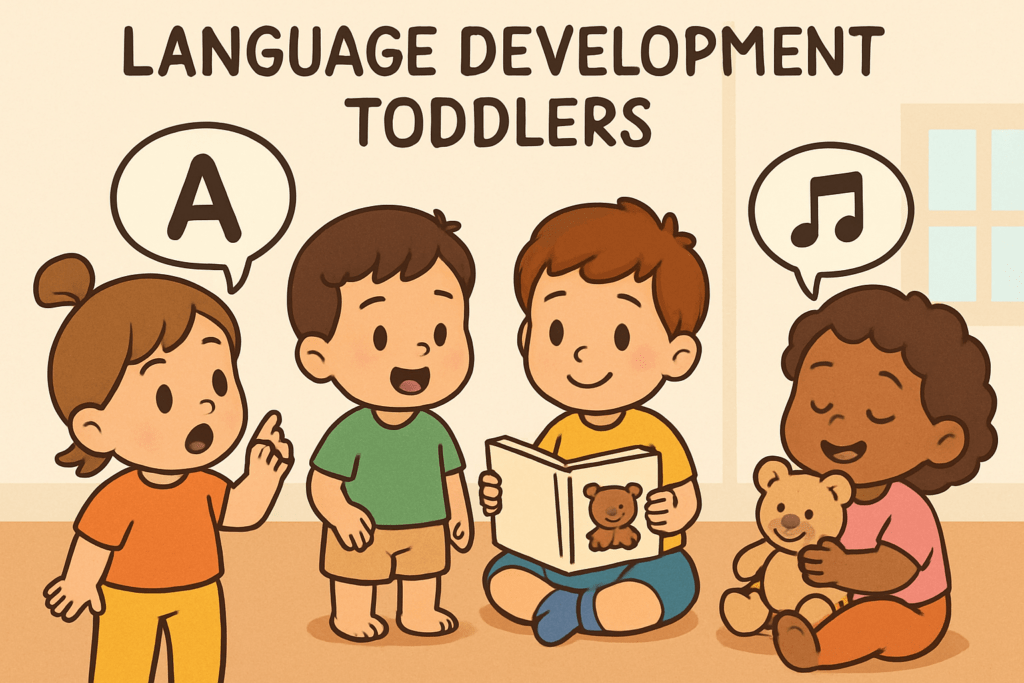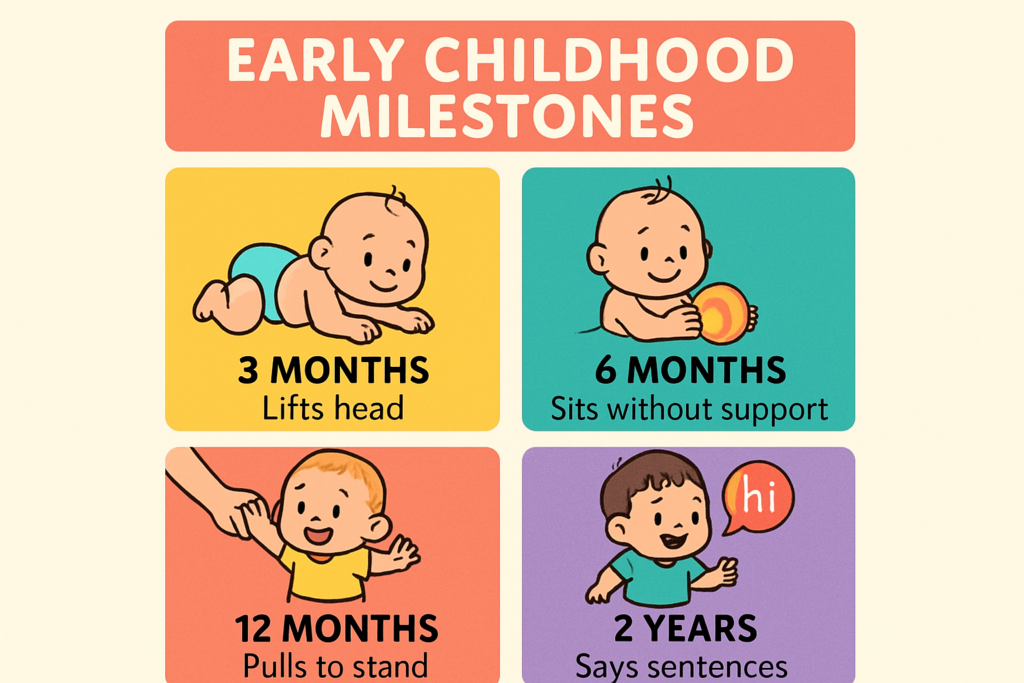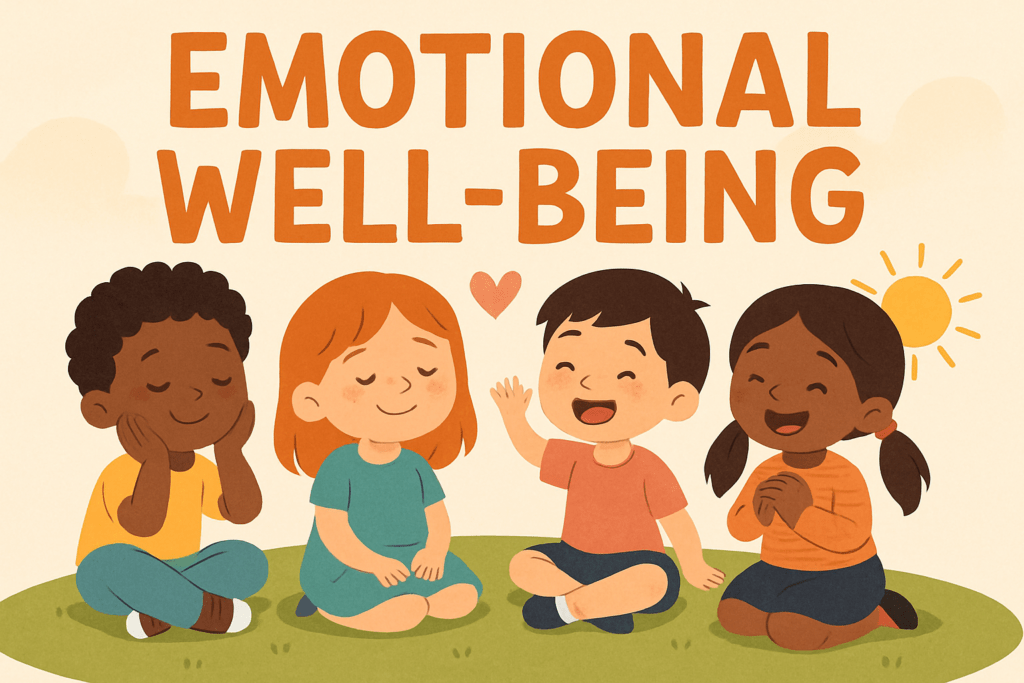Introduction: Why Language Development in Toddlers Matters
- Briefly explain the impact of early language skills on learning and relationships.
- Highlight that toddlers absorb language quickly through play and daily conversation.
- Introduce the primary keyword: language development toddlers.
Introduction: Why Language Development in Toddlers Matters
Words are more than sounds—they’re tools for thinking, learning, and building close bonds. Early language skills shape everything from how toddlers express what they need (“More juice!”) to how they connect with you and the world. Kids who build a strong foundation in language development as toddlers often find it easier to learn in school, get along with friends, and say what they mean.
Here’s the kicker: Toddlers soak up language like mini-sponges, just by being around talk, laughter, and play. Every silly rhyme, every story at bedtime, every kitchen-table conversation—it all counts. Daily moments become huge learning opportunities, even when you least expect it.
At its core, language development in toddlers is a mix of science and magic. It happens fast, but you don’t need to buy special gadgets or memorize parenting books. Ordinary days and genuine back-and-forth are enough. In the sections that follow, you’ll find practical, no-nonsense ways to support your child’s communication… and maybe even enjoy the journey a little more.
What Happens After Winning Millions?
Winning a life-changing lottery jackpot is every player’s dream, but few are prepared for what comes next. The sudden influx of wealth can bring excitement, but also a wave of challenges. Many winners find themselves overwhelmed by financial decisions, from managing taxes to making smart investments. Some handle it well, while others struggle with reckless spending that drains their fortune faster than expected.
The Financial Reality of Winning
Many winners face critical financial decisions almost immediately:
- Taxes and Legal Issues
- A large chunk of the winnings often goes to taxes, and failing to plan can lead to legal troubles.
- Investing vs. Spending
- Some winners hire financial advisors to ensure long-term security, while others spend impulsively without a plan.
- Budgeting for the Future
- Without proper money management, even the biggest jackpots can disappear quickly.
A Lifestyle Overhaul
A sudden fortune changes life in more ways than one:
- Luxury Purchases
- Mansions, sports cars, and extravagant vacations become instantly affordable.
- Social Pressure
- Long-lost friends and distant relatives often reappear, expecting a share of the winnings.
- Privacy Challenges
- Some winners struggle with unwanted media attention and public scrutiny.
While some winners embrace their new wealth openly, others choose to live discreetly to avoid pressure and expectations.
Giving Back and Creating a Legacy
For some, wealth is not just about personal luxury—it’s an opportunity to make a difference. Many winners choose to:
- Donate to Charities and Community Projects
- Supporting causes that matter to them through donations and active involvement.
- Fund Scholarships or Support Education Initiatives
- Investing in the future by empowering the next generation.
- Invest in Businesses That Create Jobs and Opportunities
- Supporting economic growth and development by backing innovative ventures.
Some lottery winners go from players to philanthropists, proving that wealth can be used to leave a lasting impact. However, not all stories end positively—many who fail to manage their winnings properly find themselves bankrupt within years.
Simple Everyday Ways to Foster Toddler Language Growth
You don’t need fancy flashcards or a background in child psychology to help your toddler grow their language skills. The secret ingredients are already in your daily routine: talking, reading, singing, and engaging with your child in real, meaningful ways. Here’s how you can make every day count for your toddler’s language development:
1. Talk, Narrate, and Listen
Start with the basics: talk to your toddler all day long. Narrate what you’re doing, whether you’re slicing bananas or folding laundry (“Now I’m putting your shirt away”). Describe your actions, the weather, or what you see out the window. The more words your toddler hears, the better. But don’t just flood the air with noise—pause and let your child chime in, even if it’s just a gurgle, a point, or a made-up word. Those moments matter. Everyday routines—like getting dressed, meals, and even diaper changes—are all golden chances for natural conversation.
2. Read Together—Early and Often
Books are power tools for language. Pick ones with bold pictures and simple, catchy phrases. Forget about finishing the story “the right way”—if your toddler wants to flip back to their favorite page 20 times, go with it. Let them finish a sentence or name what they see. Pause and ask little questions: “Who’s that?” or “What sound does the cow make?” These simple acts lay down the building blocks for vocabulary, attention, and connection.
3. Sing, Rhyme, and Play
Toddlers might not sit still for a full story, but a song or rhyme? Game on. Nursery rhymes, silly songs, and rhythmic clapping all boost language and listening skills. Try games like “I Spy” or quick rounds of naming objects around the house (“Where’s the spoon? Can you say ‘spoon’?”). Don’t worry about being pitch-perfect; your toddler just wants to hear your voice. Mimicking animal noises and echoing funny sounds counts as language practice, too.
4. Encourage Conversation
When you ask questions, don’t settle for “yes” or “no” answers. Open things up: “What did you see at the park?” Celebrate every response. If your child says “truck!” you might respond, “Yes, a big blue truck with noisy wheels!” This teaches them how conversations work—taking turns, growing ideas, using new words. When they attempt words, smile, nod, and encourage them. Confidence is half the battle.
No gimmicks or gadgets required: just your voice, your ears, and a little patience. Small, consistent efforts add up. Every chat, song, and story is a brick in the foundation of your toddler’s language skills.
1. Talk, Narrate, and Listen
The easiest way to boost language development in toddlers? Simply talk to them. Narrate your day out loud: “Now I’m pouring your milk,” or “Let’s put on your blue shoes.” Everything you do together is a chance to feed them new words. Leave space for your child—pause, wait, and let them respond. Sometimes they’ll answer with a word, sometimes with a babble or a grin; either way, they’re learning that communication is a two-way street.
Don’t overthink it. Whether it’s getting dressed, making breakfast, or walking to the mailbox, treat every routine as practice. The key: be consistent, be patient, and really listen. Even if your child is only making sounds, copying their babble and responding with real words models conversation. No fancy tools required—just your regular day, a bit more talk, and ears ready to listen.
2. Read Together—Early and Often
This one’s simple: grab a book and sit together. Don’t overthink it—toddlers love repetition, rhymes, and bright pictures. Pick sturdy board books with easy words and bold images. Pause and point at the pictures. Ask, “What’s that?” Let your toddler babble, guess, or just point. If they lose interest and start flipping pages out of order, that’s fine—follow their lead.
Give your child a turn to “read”—maybe they finish a sentence, make up a story, or just name what they see. Reading out loud, no matter how short the session, is a double win: you’re nurturing their language skills and building a cozy habit they’ll carry for years. Stories become jumping-off points for conversation. “Why do you think the dog is hiding? What would you do?” No fancy setup needed. Snuggle, read, talk about the pictures, and repeat. That’s the backbone of strong toddler communication.
3. Sing, Rhyme, and Play
Songs do wonders for toddler language development. You don’t need to be in tune—just dive in. Classics like “Twinkle Twinkle” or “The Wheels on the Bus” turn simple words into bite-sized, catchy phrases. Even toddlers who aren’t speaking yet benefit—singing builds listening and memory skills.
Nursery rhymes are the original language hacks. The rhythm and repetition help kids catch new sounds and figure out how words fit together. Try clapping or tapping to the beat. This isn’t just fun; it’s your toddler learning patterns and syllables.
Games make language stick. Point out and name things as you go: “Look, a blue sock! Can you find another sock?” Little ones love “I Spy” or naming whatever they see out the window. These games sneak in new words without pressure.
Go for imitation. Say an animal sound or a silly word, then pause—toddlers love to copy. Make it a game, not a test: “Can you say ‘moo’? How about ‘beep beep’?” Celebrate every attempt. It all counts.
The goal isn’t perfection. It’s about keeping things playful and relaxed. Songs, rhymes, and games are your daily toolkit for building toddler communication and confidence, one giggle at a time.
4. Encourage Conversation
Toddlers aren’t just soaking up words—they’re gearing up for real back-and-forth exchanges. Start by asking open-ended questions. Skip the yes/no stuff and go for things like, “What did you see at the park?” or “How did the blocks tumble down?” These prompts invite your kid to explain, wonder, and use more words, even if the answers are short and sweet.
When your toddler points and shouts, “Dog!” don’t stop there. Stretch it out: “Yes, that’s a big brown dog! He’s wagging his tail.” This simple habit—called “expanding”—teaches sentence structure and adds new vocab naturally.
Most importantly, show genuine interest when your little one tries to communicate. Nod, smile, and respond, even if it takes them a while. Repeat or gently correct mispronunciations without pressure. Every attempt is a win. Positive feedback (“You said that so clearly!”) builds their confidence, making them more willing to try out new words and ideas.
Don’t worry about silences or stumbles—they’re part of the process. Give plenty of space for your toddler to gather their thoughts. Tuning in and making conversation part of your daily routine, whether at breakfast or in the bath, helps language development in toddlers feel effortless and fun.
What Happens After Winning Millions?
Winning a life-changing lottery jackpot is every player’s dream, but the reality of sudden wealth often brings a mix of excitement and challenges. Beyond the initial thrill, winners must navigate complex financial decisions, lifestyle changes, and newfound social dynamics.
Financial Choices and Challenges
With sudden wealth comes a myriad of financial responsibilities:
- Tax Obligations: A significant portion of the winnings may be claimed by taxes, and mismanagement can lead to legal issues.
- Investment Decisions: Some winners hire financial advisors to plan for long-term security, while others may spend recklessly, risking rapid depletion of their fortune.
- Budget Planning: Without a strategic approach to budgeting, the dream of unending riches can quickly transform into a financial nightmare.
Lifestyle Transformations
A lottery windfall often leads to immediate lifestyle upgrades:
- Luxury Acquisitions: “Big ticket” purchases such as luxury homes, exotic cars, and lavish vacations become accessible.
- Social Dynamics: Requests for financial help can increase as friends and distant relatives come forward, sometimes creating tension.
- Public Scrutiny: Not all winners adapt well to the sudden attention, with some choosing to lead a low-profile life to avoid unwanted exposure.
Giving Back and Building a Legacy
For many, newfound wealth opens opportunities to make a positive impact:
- Philanthropy: Some winners channel their funds into charitable donations and community projects.
- Investing in the Community: Initiatives might include funding scholarships, launching nonprofits, or revitalizing struggling towns.
- Legacy Considerations: How winners choose to handle their money can determine the legacy they leave behind.
While stories of both financial triumph and collapse exist, the way winners manage their riches influences not only their own futures but also the broader impact they have on their communities and society.
The Role of Environment and Example
Want to boost your toddler’s language skills? Start with what surrounds them—your actions, words, and environment matter more than fancy gadgets ever will. Kids learn by watching and listening, and the people closest to them are their first and best teachers.
Keep screen time low and replace it with real talk. Face-to-face conversations and shared moments—meals, walks, silly dances—are where kids pick up language naturally. Those daily chats and simple routines fuel language more than any TV show ever could.
Your toddler isn’t just listening to you, either. Siblings, grandparents, babysitters, and even neighborhood playgroups offer different words, accents, and rhythms. That variety broadens vocabulary and teaches kids that communication takes a lot of forms. Swapping stories or playing pretend with other children is as good for toddler communication as any flashcard.
Bottom line: create a space full of words, listening, and back-and-forth. Be the model you want your child to follow—they’ll pick up every “please,” “thank you,” and goofy sound you make. If you’re hungry for holistic ideas beyond language, check out eco-conscious parenting approaches, which often tackle broader child development, too.
Further Resources and Expert Guidance
Looking for more in-depth advice on language development in toddlers? No need to reinvent the wheel. There’s a ton of solid, practical info out there. If you want trusted, easy-to-digest guides and research-backed strategies, check out these:
- Reading Rockets’ guide to toddler language development: Straightforward breakdowns, tips for everyday routines, and links to activities that actually work.
- CDC’s milestones and tips: A simple, no-nonsense look at what to expect and when, plus signs that it’s time to get professional input.
- Zero to Three: Language and communication: Backed by child development experts, this site gives detailed advice for every stage—plus plenty of real-life examples.
- Got bigger concerns? Your pediatrician or a licensed speech-language pathologist is always the best next step when things feel iffy.
You don’t have to go it alone—these resources have your back.
Conclusion: Your Toddler, Their Words, and the Joy of Connection
There’s no magic shortcut—language development in toddlers happens one small, steady step at a time. Everyday talk, silly songs, and simple stories truly add up. The key ingredients are pretty spartan: show up, chat, listen, repeat. Whether your toddler is already rattling off stories or still figuring out first words, what matters most is your encouragement and attention. Celebrate the tiny milestones—a new sound, a favorite word, a funny “sentence.” Don’t stress the pace. There’s no such thing as “falling behind” when you’re connecting, playing, and sharing words together. Every laugh, every question, every book counts. Let language be part of your daily rhythm, and watch your child’s world—and confidence—grow.


 Health & Nutrition Editor
Health & Nutrition Editor
